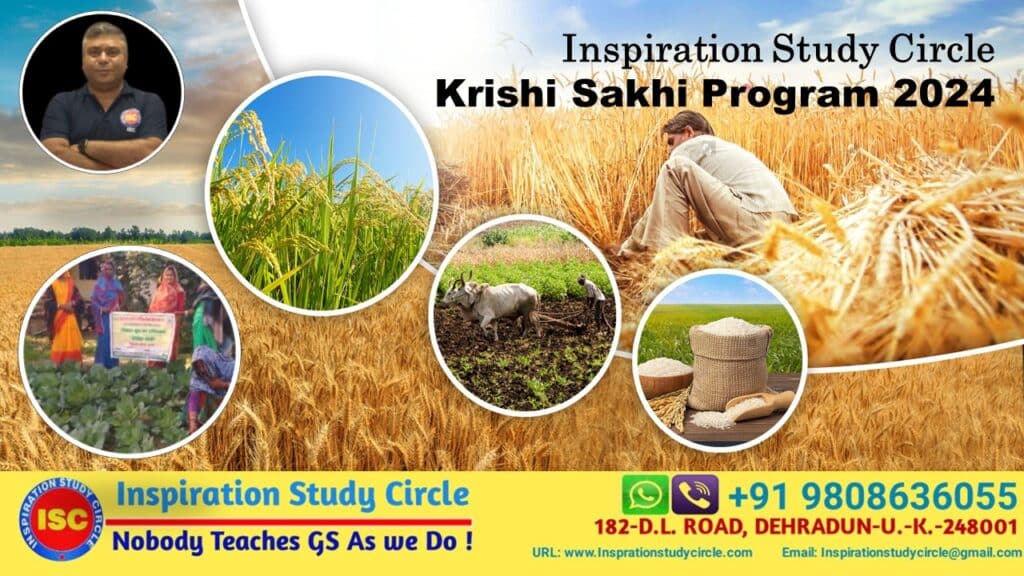
UKPSC- PCS 2026 Prelims Test Series
UKPSC- PCS 2026 Prelims Test Series Table of Contents UKPSC- PCS 2026 Prelims Test Series The Uttar Pradesh Provincial Civil
The Krishi Sakhi Program is an initiative implemented in various states of India to empower women farmers and enhance their knowledge and skills in agricultural practices. “Krishi Sakhi” translates to “Agriculture Friend” in Hindi.
The program aims to address the gender gap in agriculture and promote women’s participation in farming activities. It recognizes that women play a significant role in agricultural production but often face challenges such as limited access to resources, lack of information, and limited decision-making power.
Under the Krishi Sakhi Program, women are selected and trained to become agricultural entrepreneurs or “Krishi Sakhis.” These Krishi Sakhis act as facilitators and agents of change in their communities. They receive training in various aspects of agriculture, including modern farming techniques, crop management, soil health, pest management, and post-harvest practices.
Once trained, Krishi Sakhis work closely with women farmers in their villages, providing them with information, guidance, and support. They act as a bridge between the women farmers and government agricultural departments, helping them access government schemes, subsidies, and other agricultural resources. Krishi Sakhis also assist in organizing training programs, demonstrations, and awareness campaigns to disseminate knowledge and create awareness among farmers.
The Krishi Sakhi Program aims to improve the livelihoods of women farmers, increase their agricultural productivity, and promote sustainable farming practices. By empowering women in agriculture, the program contributes to rural development, poverty reduction, and overall agricultural growth.
It’s important to note that the Krishi Sakhi Program may have specific variations and implementation models in different states or regions of India, as it is often tailored to suit the local context and requirements.

– The Krishi Sakhi Program aims to empower rural women in agriculture by training and certifying them as Krishi Sakhis (agriculture friends).
– The program recognizes the crucial role of women in agriculture and aims to enhance their skills and participation.
– The program has been rolled out in 12 states in phase 1, including Gujarat, Tamil Nadu, Uttar Pradesh, and Madhya Pradesh.
– The program targets training 90,000 women in its first phase.
– The Krishi Sakhi Program is a flagship initiative under the MoU between the Ministry of Agriculture and Farmers’ Welfare and the Ministry of Rural Development.
– Prime Minister Narendra Modi has awarded certificates to over 30,000 self-help groups as Krishi Sakhis in Varanasi.
– Krishi Sakhis will undergo 56-day training on various agricultural practices and extension services.
– The training includes modules on agroecological practices, seed banks, soil health, integrated farming systems, and livestock management.
– After training, Krishi Sakhis will take a proficiency test, and those who qualify are certified as Para-extension Workers.
– Empower rural women in agriculture by providing technical knowledge and skills.
– Enhance the participation of women in agriculture and improve agricultural productivity.
– Trained Krishi Sakhis can assist in agricultural operations and earn a stable income (Rs. 60,000 – 80,000 per annum).
– The program offers opportunities for rural employment, enhancement of agricultural skills, and financial benefits.
– Eligible participants are Indian women aged 18 years or above from rural areas.
– Applications must be submitted offline at the nearest agricultural department office.
Here are some more details on the Krishi Sakhi Program:
– The Krishi Sakhi Convergence Program aims to empower rural women in agriculture across India.
– The program aims to create 3 crore Lakhpati Didis.
– Krishi Sakhis are chosen as agriculture para-extension workers because they are experienced farmers and are trusted community resource persons.
– Krishi Sakhis will undergo 56-day training on various extension services.
– The training includes modules on agroecological practices, seed banks, soil health, integrated farming systems, and livestock management.
– As of June 18, 34,000 Krishi Sakhis have been certified as Para-extension Workers.
– The program has been rolled out in 12 states in phase 1, including Gujarat, Tamil Nadu, Uttar Pradesh, Madhya Pradesh, Chhattisgarh, Karnataka, Maharashtra, Rajasthan, Odisha, Jharkhand, Andhra Pradesh, and Meghalaya.
The Krishi Sakhi Program is an initiative that has been implemented in several states across India, including Uttar Pradesh, Bihar, Haryana, Punjab, and Jharkhand. It was launched to empower women farmers and improve their agricultural practices and productivity.
Here are some additional details about the Krishi Sakhi Program:
The Krishi Sakhi Program has been successful in creating a network of trained women agricultural advisors who are making a positive impact on the lives of women farmers. It has contributed to enhancing agricultural productivity, sustainable farming practices, and rural development, while also empowering women and promoting gender equality in the agricultural sector.
Here are some previous similar programs in India that aimed to empower women in agriculture:

UKPSC- PCS 2026 Prelims Test Series Table of Contents UKPSC- PCS 2026 Prelims Test Series The Uttar Pradesh Provincial Civil

Explained: India AI Impact Summit 2026 Table of Contents India AI Impact Summit 2026 India AI Impact Summit 2026 The India

The Corruption Perceptions Index, and The Henley Passport Index Table of Contents The Corruption Perceptions Index, and The Henley Passport

India- USA Interim Trade Agreement (2026) Table of Contents India- USA Interim Trade Agreement (2026) In early February 2026, India and

Explained: India- EU FTA “The Mother of All Deals” Table of Contents India- EU FTA “The Mother of All Deals

UPPSC- 2026 Calendar Released Table of Contents UPPSC- 2026 Calendar Released Brought to you by Inspiration Study Circle UPPSC- 2026